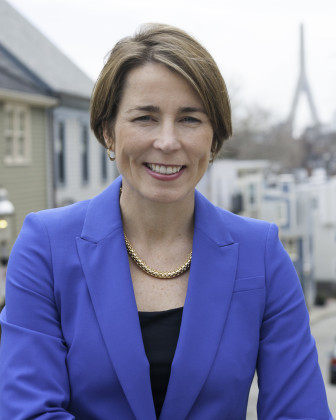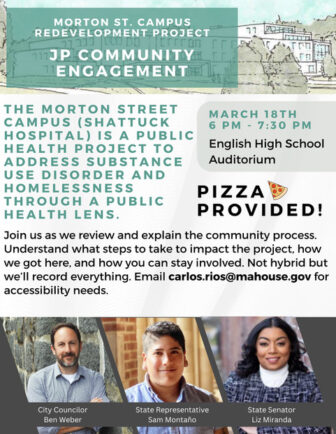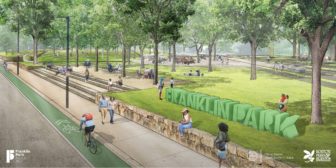State Rep. Jeffrey Sanchez outlined a few of what he called “challenges” to an almost full Jamaica Plain Neighborhood Council on March 22.
“We have a new governor and lot of new members but I’ve been there for 14 years,” said Sanchez, D-Jamaica Plain. “The budget is a challenge, but it’s not like last year.”
First elected in 2002 to succeed the late legendary state Rep. Kevin Fitzgerald, Sanchez is the chairman of the Joint Committee on Health Care Financing. During the Neighborhood Council, Sanchez spent most of his time on health related issues notably the “opiate epidemic… It’s a big issue for the governor .. I’ve been to 36 hospitals and health centers around Boston… the pills are just out there.”
Joining with state Rep Liz Malia, Sanchez said he is working on how to get “better education, treatment and screening” for those suffering from addiction.
It’s not just a so called inner city issue. “I’ve been going around the state,” he said. “…the opiate problem is a statewide problem… from Scituate to the Berkshires.”

Referring to both his entire district (Mission Hill, Roslindale and a precinct in Brookline) and Jamaica Plain Sanchez said, “We live in the most incredible community in the state.”
The 15th Suffolk is also one of the most diverse, sweeping from the edge of the Longwood Medical Center to bucolic Allandale Farm; it also includes three public housing developments, Bromley-Heath, and Mission Main and High Street in Brookline; two of the three business districts in Jamaica Plain, half of Centre South and all of Hyde-Jackson Square; and 1/3 of the Emerald Necklace park system with Jamaica Pond, Wards Pond and Leverett Pond.
“But we have isolated patches, too,” he added. “As someone who grew up in this community I felt isolated and ignored.”
Sanchez pointed out the work of his legislative aide Joshua McFadden — who rarely misses a community meeting in Jamaica Plain — for his work in helping the Bromley-Heath community feel more connected to his office, but also with Jamaica Plain as a whole. McFadden organizes all types of events from hotdog and movie nights, to support for the tenant organization and public safety meetings.
“Another big thing is provider costs,” he said. “Health care treatment and medication — even with insurance — is too expensive. It’s a $500 million business for large providers like Partners Health Care and the South Shore system.”
This is a very important issue for the service employees union SEIU who represent janitors, security guards and, ironically, health care workers.
“We’re working on a price ban to help reimburse community hospitals and low wage workers,” he said. “This is a really big one. We’re trying to get the system down so that costs can’t go above between 10% or 20% of average prices. This is difficult to achieve. We don’t want to disrupt the health care system.”
“Another big one is prescription drugs. We have the treatment for the care, but one pill can cost [hundreds or thousands]. Pharmaceutical companies are reaping fortunes,” said Sanchez.
“We need price caps, as well as transparency on the actual costs of prescription drugs.”
“We spent a big part of the session [on the Health Financing Committee] on managed care in the Medicaid system; enrollment costs and pharmaceutical costs. In some cases these are substantially different from commercial carriers like Harvard Health.”
Sanchez said his committee is looking at benchmarks that commercial carriers can use before someone gets treatment.
“Everybody gets excited with health care changes,” he said. “Health care is 13% of the gross domestic product of Massachusetts.”
“My other concern is affordable housing,” said Sanchez. “I’m a product of the housing project at Mission Hill.”
“The real development is going on at Jackson Square. Frankly that’s where everybody wants to build.”
But it has a lot of empty parcels and contaminated land. He is concerned that the costs of building new housing is driving up prices and rents. One solution he favors is to increase state funding for brownfields clean up to $15 million. This would reduce building costs, he added, “Currently there is no money to clean up parcels.”
Parkways and public ways are also important to the representative who expressed frustration in achieving his goals.
“The bane of my existence is DCR. I’ve worked with them since 1995 [when it was the MDC and he was Mayor Thomas Menino’s liaison to the Latino community]. I have a long history of trying to get things done with DCR. There are three projects currently on their radar: Centre Street at Kelly Circle; the Arborway, and Perkins and Cabot Streets.”
“There are certain [outstanding] commitments such as law enforcement. signage and lighting.”
“I am constantly losing my mind over what do we do with DCR.”
But he is encouraged by Governor Charlie Baker’s recent appointment of Leo Roy as the new DCR commissioner. Roy worked at the Boston School Department athletic division under Mayor Ray Flynn and his responsibilities included White Stadium.
“We lucked out [with Roy],” said Sanchez who added he wants to work with him “on how to handle things this spring.”





